Dog Not Drinking Water (All the Possible Causes & Solutions)
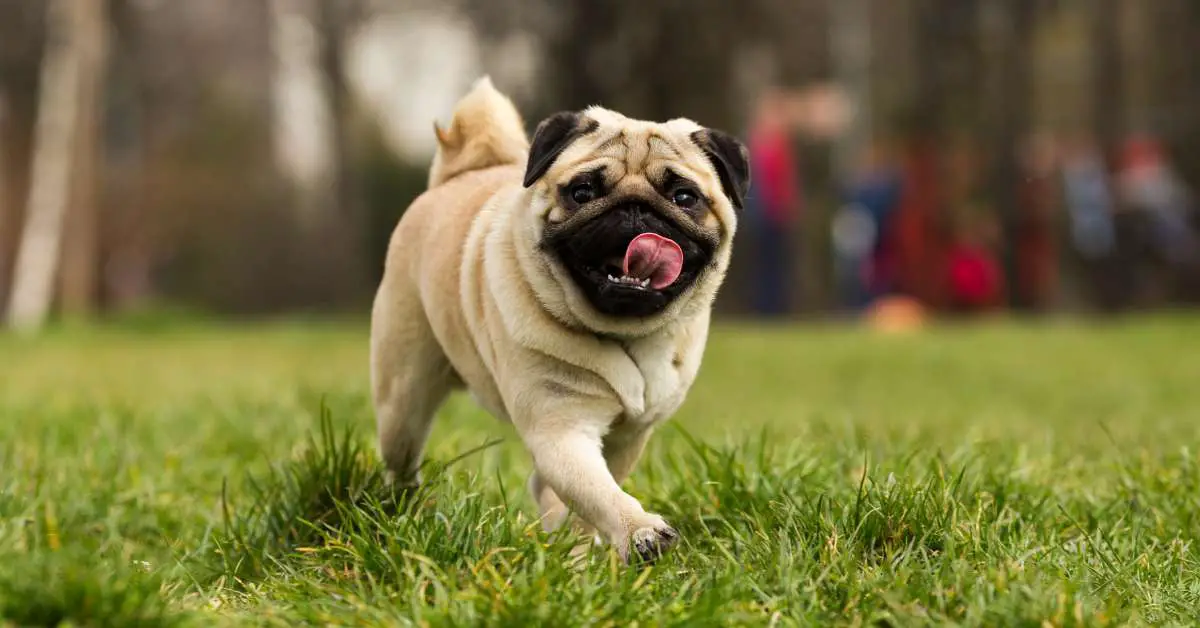
Dogs, like people, need to drink water regularly. It is an extremely important factor in maintaining their overall wellness and health. Water has a role in the regulation of body temperature, the facilitation of digestion, and the maintenance of healthy organ function.
In addition to this, it helps keep joints moisturized, promotes healthy cell activity, and distributes important nutrients throughout the body. Pets, especially dogs, can dehydrate without adequate water intake, leading to serious health issues.
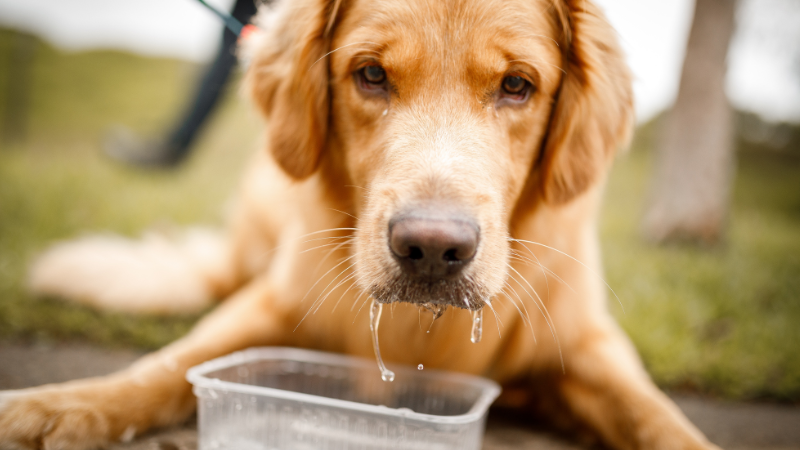
Reasons Why Dogs Won’t Drink Water
Oral Issues or Damaged Teeth
If a dog suffers from oral pain or has broken teeth, it may avoid drinking it since it is uncomfortable for them to do so.
When this occurs, it is critical to have a vet immediately so that he can evaluate their dental health to address any underlying problems that may be present.
Health Issues
The desire of a dog’s thirst to drink water can be affected by several different health issues. For example, dogs with renal illness, urinary tract infections, or gastrointestinal difficulties may drink less water than normal.
It is essential to treat the underlying issue and provide veterinarian supervision in order to promote healthy hydration levels in the animal.
Anxiety
In dogs, stress and anxiety are common, negatively impacting their eating and drinking patterns. The dog won’t drink water if he is suffering from anxiety.
It’s common for dogs to drink less water when they’re faced with anything that makes them anxious, including loud noises, the fear of being alone, or even just a disruption in their normal routine.
It’s possible that adopting behavioral approaches and making their environment more relaxing and pleasant will help them feel less anxious.
Fear & Negative Experiences
A fear response in a dog may be triggered by events related to drinking but are not positive, such as an accidental spill of water or being startled by a loud noise while drinking. Because of this worry, a person can avoid being near water over time.
The dog won’t drink water if he fears something. Fear also leads to reduced body weight. So, if you think the dog is not drinking water due to fear, then you must take your pup to the vet.
Dogs may be taught to overcome their anxiety and create a regular, healthy drinking pattern using techniques like positive reinforcement, patience, and progressive desensitization.
Old Age
It’s possible that as dog’s age, their senses, especially their thirst sense, become less acute.
Older dogs or adult dogs may have trouble understanding the water requirements of their bodies, which might cause them to drink less water.
Frequent observation of older dogs is essential to avoid the difficulties that might arise from dehydration, encouraging them to drink water consistently.
Fact: Dog’s water intake reduces as they age.
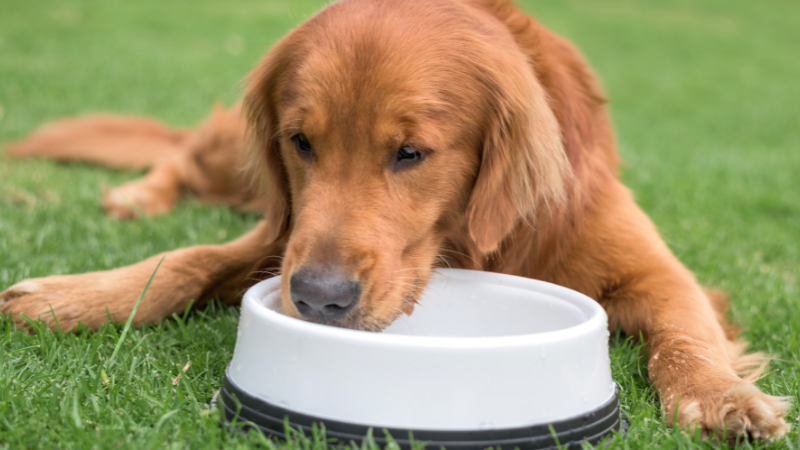
New or Unfamiliar Environment
A dog’s habit might be thrown off if they experience a change in their surroundings, such as when they move to a new place or go on a trip, making them reluctant to drink water.
They might have feelings of unease or uncertainty due to the new environment. It is possible to encourage them to drink water in unfamiliar situations by providing familiar things, such as their water dish or adding flavoring ingredients to the water.
Change in Water Source
A dog won’t drink water if you change the smell, flavor, or temperature of its water.
They may become reluctant to drink if you switch up their water bowl or supply of water without properly acclimating them to the new bowl or source of water.
This challenge may be surmounted by implementing changes in stages and checking to see that the water is clear and uncontaminated.
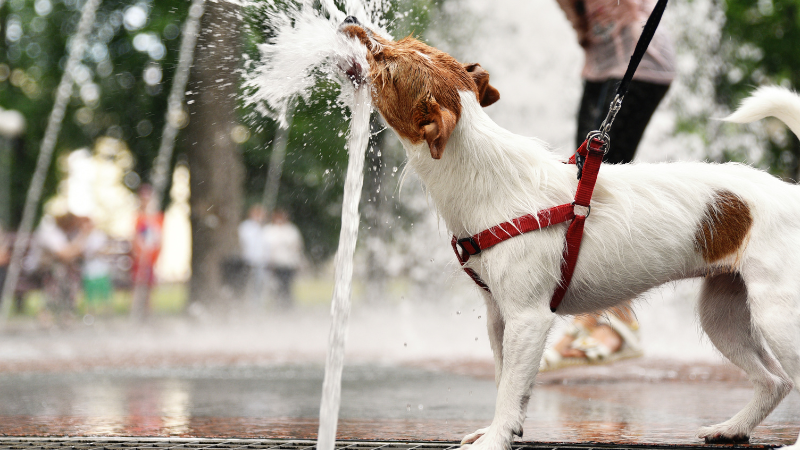
Try to provide fresh, clean water to your pups at every cost. Here’s why you should avoid giving tap water to your dogs.
Type of Food
A dog’s water consumption can be affected by the kind of food they eat. A dog won’t drink water if you change the type of food. kibble, for instance, as opposed to wet food or food from a can, may cause many dogs to drink more water.
Changing the diet to include more foods that are high in moisture or adding water to dry foods can assist in guaranteeing appropriately hydrated.
Changes in the Weather
Extreme weather conditions, such as hot summers or cold winters, can affect the amount of water a dog drinks. Many dogs are affected by weather changes.
When it’s chilly outside, dogs could drink less water to be hydrated, but when it’s hot outside, they might drink more water to stay hydrated.
It is crucial to monitor how much water they consume and ensure they can access clean water at the optimum temperature.
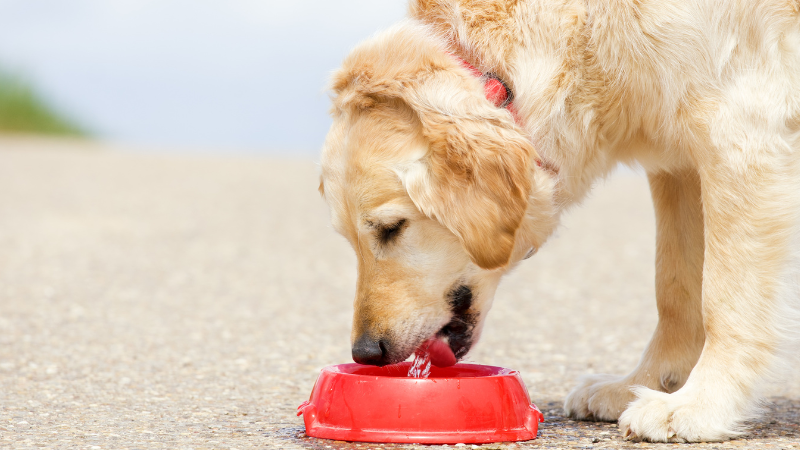
Signs of Dehydration in Dogs
It is essential to be aware of the signs of dehydration in canines since the effects of this condition can be devastating. The following are some of the most prevalent signs of dehydration:
- Loss of appetite
- Reduced urine output
- Loss of skin elasticity
- Lethargy or weakness
- Panting excessively
- Dry gums and sticky saliva
- Dry nose
- Sunken eyes
If you suspect your dog is dehydrated, it’s important to seek veterinary attention promptly. It is our duty as good pet parents. Pet insurance can also help any potential dog owner in difficult times.
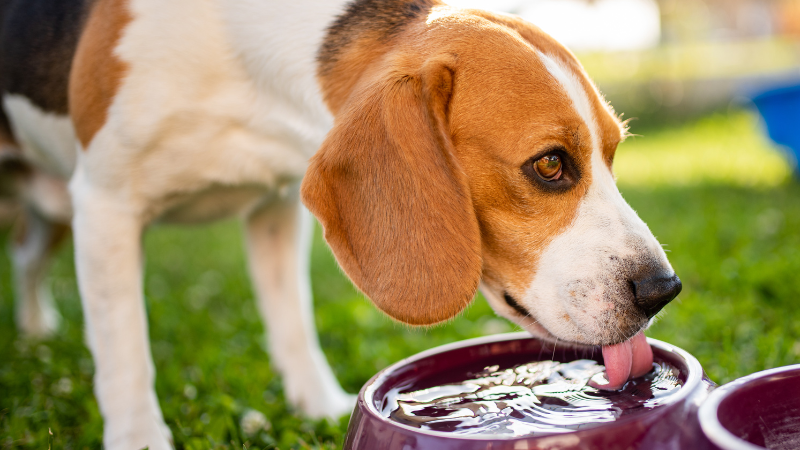
Here you can see the tolerance level of your dog’s body against dehydration.
How to Get a Dog to Drink Water?
A dog’s hydration and overall health must be encouraged to drink water regularly. Here are some tips:
Ensure a Clean and Fresh Water Supply
It is important to provide dogs with clean, fresh water (at least one bowl) that is also within easy reach for them to drink. Maintain a clean water bowl for them and give them clean water regularly throughout the day.
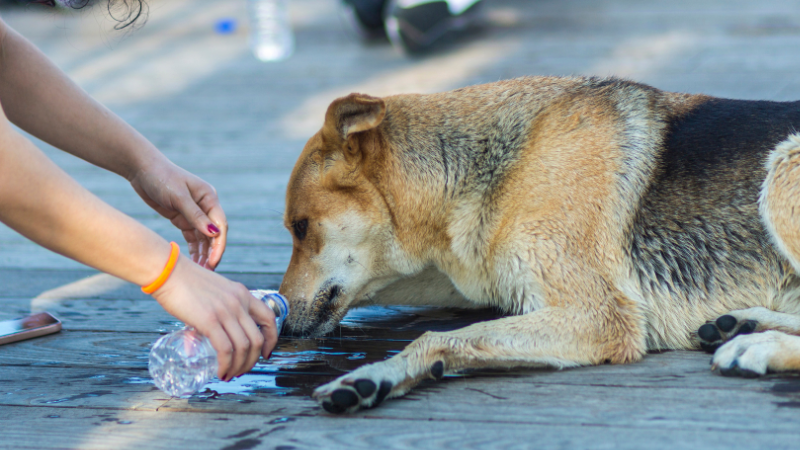
Optimize Water Bowl Placement
Put the dog’s water bowl in a place that is calm, easy to get to, and where he or she is most at ease. It is best not to put it in the laundry room, a high-traffic location or anywhere near their feeding bowl.
Consider Bowl Type
Some dogs prefer consuming their water from particular kinds of bowls. Experiment with various materials, sizes, and forms to find which one your dog enjoys playing with the most.
Try Different Water Temperatures
Certain dogs have specific preferences regarding the temperature of the water they drink. Some canines choose chilled water, while others are OK with it when it is at ambient temperature. Experiment to determine the temperature that your dog drink water and finds most comfortable.
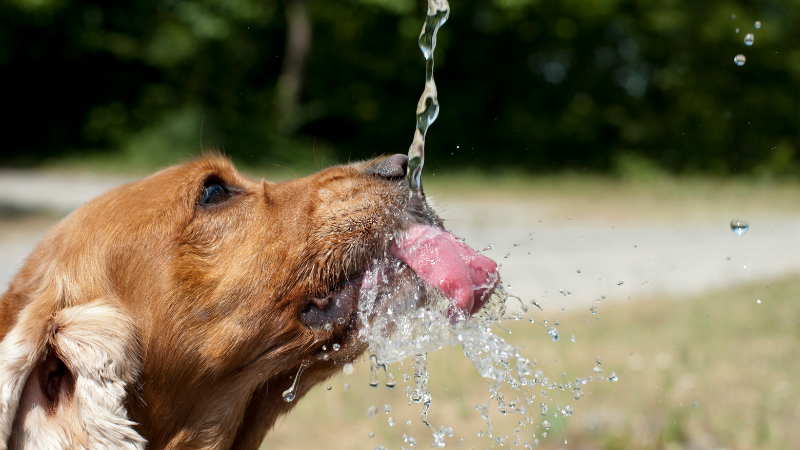
Tip: If your dog refuses to drink water from the bowl, then always prefer to give them fresh and clean water in the bowl.
Add Flavor or Moisture
If you notice that your dog is reluctant to drink plain water, you could try mixing in a little low-sodium broth or wet food with the warm water in a very little amount.
This may encourage them to eat more bowls of food and drink more, improving their overall hydration level.
Monitor Food Intake
Dry food/dry kibble may cause dogs to consume more water, so providing them with a well-balanced diet that includes items high in moisture is important. This will help them consume a huge quantity of water overall.
Encourage Regular Water Breaks
Give your dog maximum opportunities to consume water regularly throughout the day by giving it of water after meals, after walks, and during playtime. You may also coax them delicately in the direction of their water bowl.
Use a Fountain or Running Water
Some canines are drawn to the sound of rushing water. Consider investing in a pet water fountain that provides a continuous water flow, as this may entice your dog to drink.
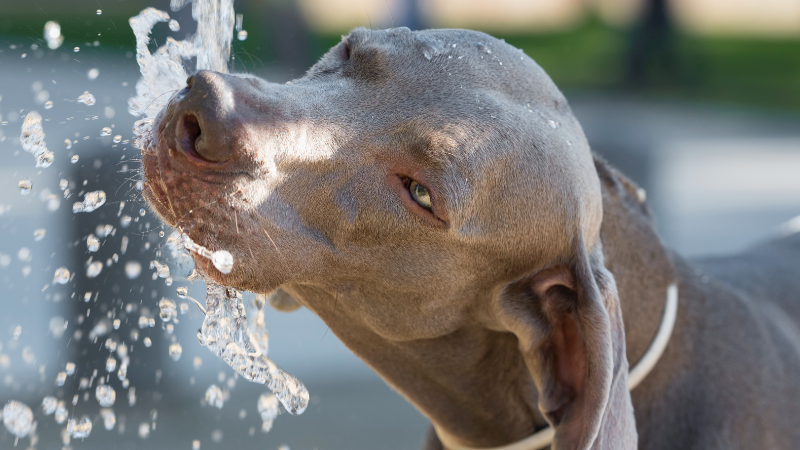
Offer Ice Cubes or Frozen Treats
On warm days, you should provide your dog with frozen treats from diluted beef broth, low-sodium stock, and ice cubes. This can provide them with hydration while also helping to calm them off.
Monitor and Seek Veterinary Advice
Be sure to check how much water your dog is drinking and look out for any symptoms of dehydration.
If your dog persistently refuses to drink water or demonstrates indications of dehydration, you and older dog should make an appointment with your veterinarian to receive an in-depth assessment and instructions.
Remember that each dog is an individual, and the same amount of things that work for one dog may not work for another.
Be patient, pay attention to your dog’s preferences, and adjust your techniques to ensure they receive the necessary water.
FAQs
How Long Can a Dog Go Without Water?
Several variables determine how long a healthy dog can go without drinking water, including the dog’s size, overall health, and the surrounding surroundings.
Dogs have the potential to live for a few days without water. It is essential to encourage regular water intake and to seek the care of a veterinarian immediately if you observe indications of severe dehydration in the animal.
Can I Add Flavorings in Water to Encourage Them to Drink?
*Adding ice cubes, a little quantity of broth, or wet food that is low in salt to your pup’s water bowl can help encourage them to drink.
However, because artificial sweeteners and excessive amounts of salt can be detrimental to dogs, avoiding flavoring canned food that includes any of these ingredients is essential.
Tip: Most dogs love multiple bowls of clean water. So, always provide clean water to your dogs and other pets (must. Clean water also reduces the chances of bacterial infection, bladder infection (urinary tract infection), tooth root abscess, sweat glands issues, and periodontal disease, and kidney disease.
My Dog Only Drinks Water When I’m Present. Is This to Be Expected?
Some dogs (sensitive noses) may feel more comfortable drinking filtered water when their dog owners are around, while other dogs prefer to drink alone.
This conduct may be the outcome of the individual’s sense negative feelings of security or connection to the individual.
Ensure your dog always has access to water, even your dog’s access, when you’re not there. This includes times when you’re away from the house.
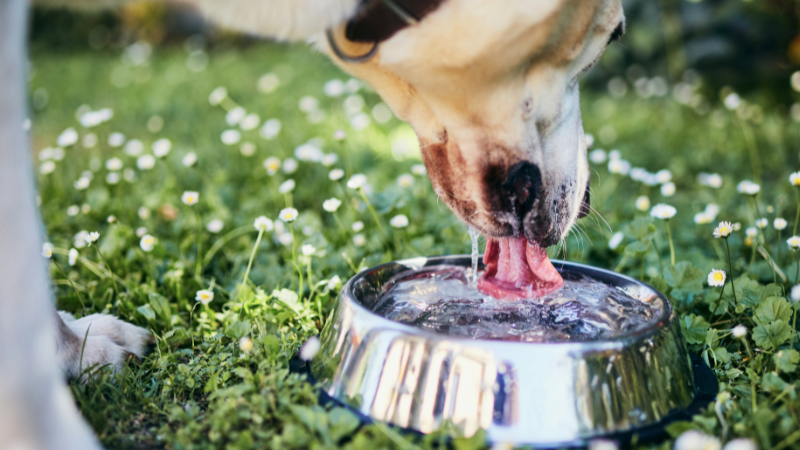
Should I Be Concerned if My Pup Drinks Excessive Amounts of Water?
Polydipsia, often known as excessive thirst or drinking, may be an indication that there is an underlying health problem.
You must check the amount of water your dog consumes, especially cold water, and seek the advice of your veterinarian if you observe a sudden rise in the amount of water consumed.
Several medical disorders can be related to excessive thirst, including diabetes, kidney disease, and hormone abnormalities. Most of the time, it is the kidney disease that can be the culprit.
How Can I Tell if My Dog Is Dehydrated?
Dehydrated dogs will exhibit symptoms such as dry gums and sticky saliva, sunken eyes, skin elasticity, lethargy, dry nose, decreased urine production, increased panting, and loss of appetite.
Other symptoms include dry gums and sticky saliva in humans. If you think your pet may be suffering from dehydration, you should have them checked out by a vet as soon as possible.
Can Anxiety or Stress Affect a Dog’s Water Intake?
A dog’s feeding and drinking patterns can indeed be altered by worry and stress, resulting in a lower volume of water consumed. In times of high stress, dogs may be too absorbed with other things or too nervous to drink water.
It may be possible to boost their water intake by cultivating an atmosphere of calm, employing behavioral approaches, and working to address the underlying reasons for their worry.
My Dog Won’t Drink Water From a New Bowl or When We’re Traveling. What Action Should I Take?
Dogs are known to be sensitive to changes in their surroundings and the water source they use.
When starting them off with a new water bowl or taking them on a trip, it’s best to use the bowl they’re used to drinking out of or ease them into the new bowl by combining the old and new water bowls together.
In addition, make sure the water is clean, provide opportunities to stop and drink water while traveling, and, if necessary, add flavorings to the water.
Are There Any Health Conditions That Can Cause a Decrease in Water Intake?
Yes, reducing water consumption might result in certain health disorders such as renal disease, urinary tract infections, digestive troubles, and dental problems.
If you observe a consistent shift in the amount of water that your dog drinks, it is imperative that you make an appointment with your veterinarian to have your dog’s health more thoroughly examined and receive the necessary treatment.
Is It Normal for Senior Dogs to Drink Less Water?
Yes, dogs’ feelings of thirst can diminish with age, which may result in their drinking less water as they age.
Nevertheless, it is essential to carefully monitor how much water they drink and ensure they drink enough to keep themselves sufficiently hydrated.
Providing moist food, an atmosphere that is pleasant for drinking, and the encouragement of regular water breaks can all support the hydration of senior dogs.
Remember that it is always preferable to speak with your veterinarian for proper examination and assistance if you have any concerns about the amount of water your dog is drinking or if you observe any indications of dehydration in your dog.
Conclusion
Dogs need access to water to maintain their overall health. Maintaining their biological processes, controlling their temperature, assisting with digestion, and fostering an overall sense of energy are all made significantly easier when they drink enough water.
But there are several reasons why a dog can choose not to drink water, such as dental problems, health problems, anxiety, fear, or being in a strange place.
As responsible pet owners, we are responsible for being aware of the warning symptoms of dehydration in our canine friends and taking preventative steps to ensure that they get enough water to drink.
We may encourage dogs to drink more water by ensuring younger dogs have a supply of clean water that is easy to get, ensuring that the dog drinking water dish is in the best possible location, providing water at varying temperatures, and even adding flavoring or moisture.
